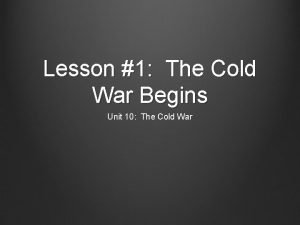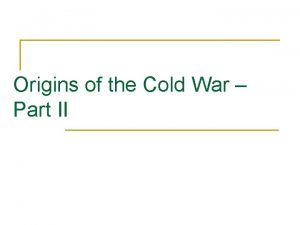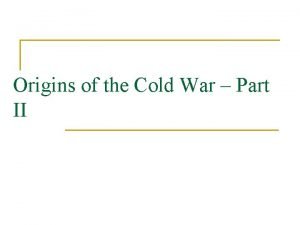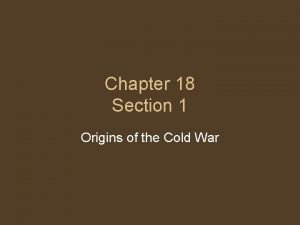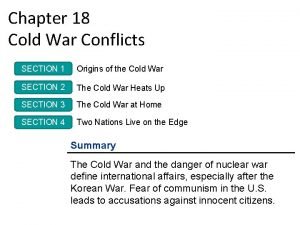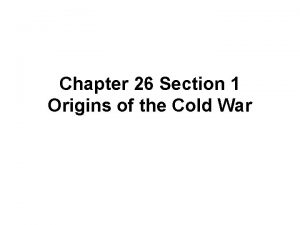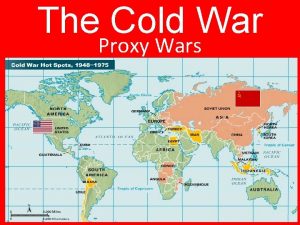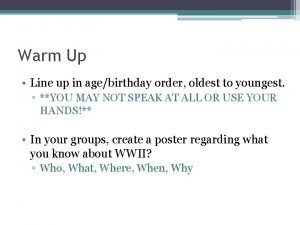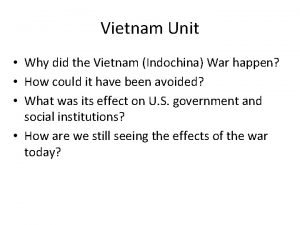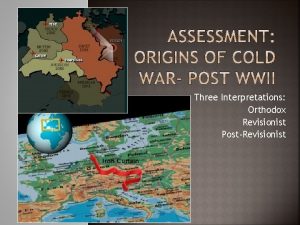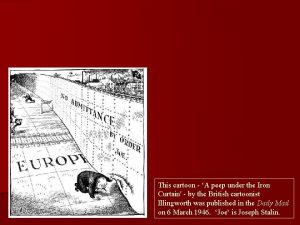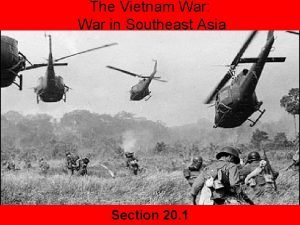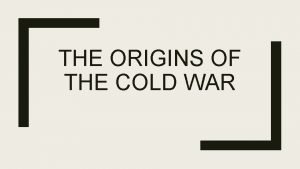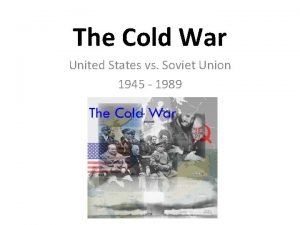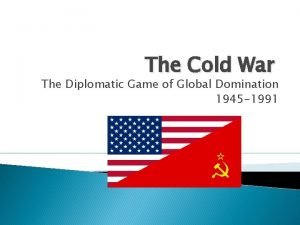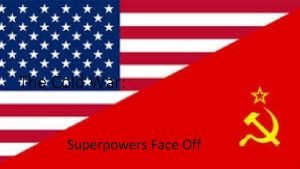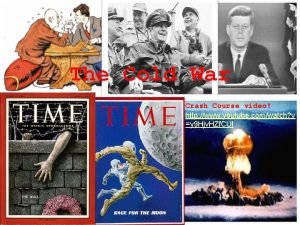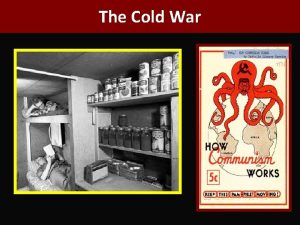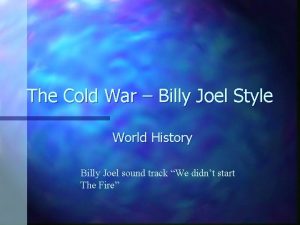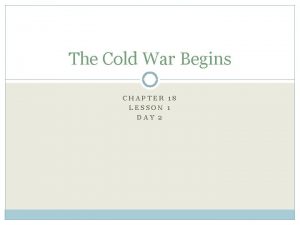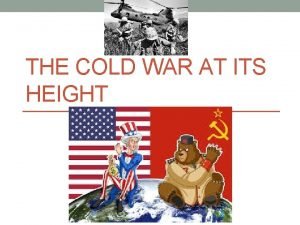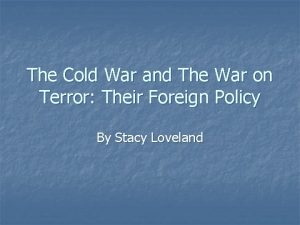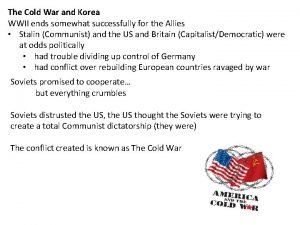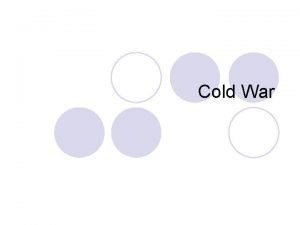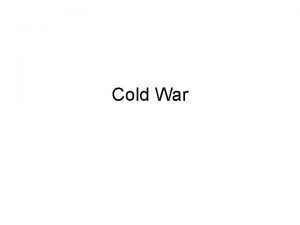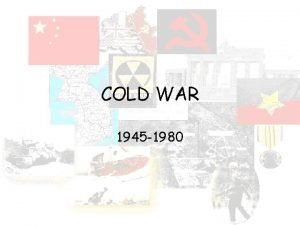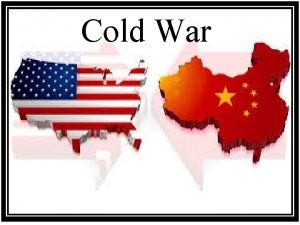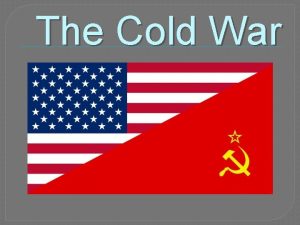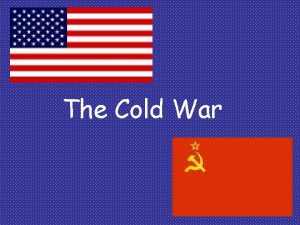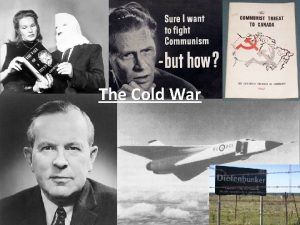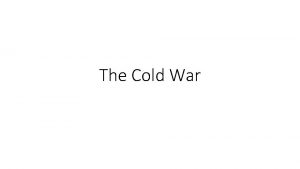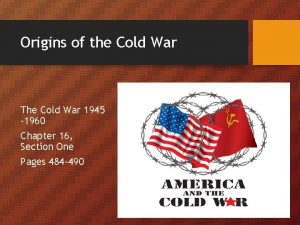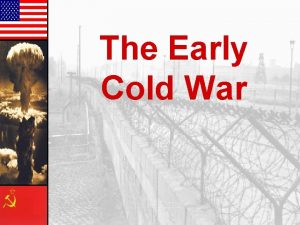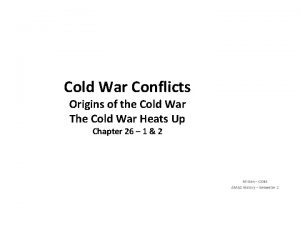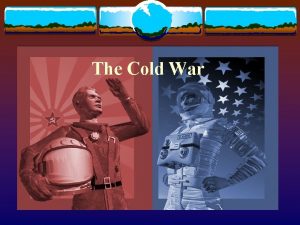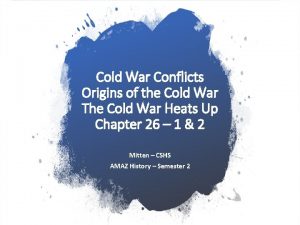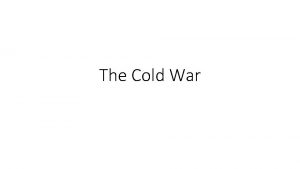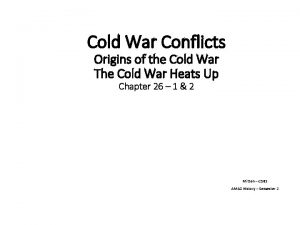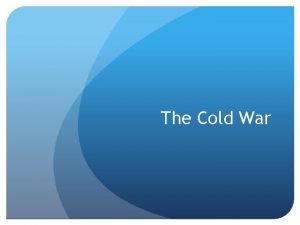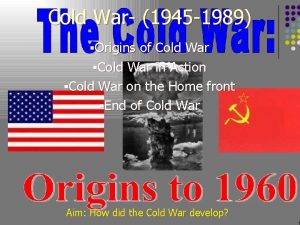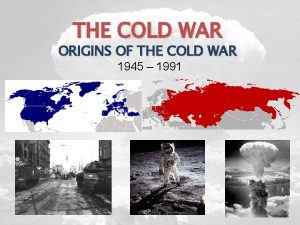Essay Writing Origins of the cold war Essay






















- Slides: 22

Essay Writing Origins of the cold war Essay Plan

What's the Question? “How important were the ideological differences between east and west in the emergence of the Cold War up to 1955? ”

Plan • Need to start with the key issue – Ideological Differences – This is a long-term cause • What should I explain in this? – What is communism? – What is capitalism? – How did this cause tensions? – Was it a key factor in causing the Cold War?

Argument in this Section? • This is the hard bit • What would our line of argument be? • Phrases – Many Historians/observers/political analysts ……… – It is clear from the facts that ……………… – Many critics would argue that …………….

For this section • Many modern historians would argue that the causes of the cold war were largely a result of the differences between communism in the east and capitalism in the west. • Many political theorists of the time were of the opinion that the conflict between capitalism and communism was inevitable therefore this heightened the sense of fear in the west.

Counter Argument • However some political commentators would criticise this line of argument as communism had been established for almost 30 years prior to the cold war therefore other factors must have played a more important role in raising tensions in between east and west.

Summing up Ideologies What is undoubtedly clear is that the ideological differences had laid the seeds of the Cold War.

Other Factors • • Experience of the second world war Yalta & Potsdam Nuclear Arms Race Berlin Crisis Changing attitudes of USA and USSR NATO Korean War

Second World War • What do I need to mention? • You should discuss – 2 nd front opening/failure to… – Soviet losses during the war – Suspicions on both sides – Warsaw rising

Argument for this as a cause • Many historians would point to the continued mistrust and tension amongst the Grand Alliance throughout WW 2. Some historians would point out that the alliance was one of necessity and disagreements and hostility was disguised rather than swept away.

Counter Argument • Some historians would argue that although the Second World War had served to heighten tension amongst the members of the Grand Alliance, the real tension occurred when the defeat of Nazi Germany created a power vacuum in Europe. • Historian Steve Phillips argues that despite the political ideologies and the Second World War the Cold War was not yet inevitable.

Summing up WW 2 What is clear was that as the war drew to an end in 1945 the strains in this relationship came to the fore.

Yalta & Potsdam • What do I need to cover? • You should discuss – What was the key points agreed about post war Europe? – What were the difficulties in coming to an agreement? – How did this make relations worse? – Were the key agreements carried out?

Argument for Conferences • It is clear that the issue of the future postwar Europe further strained relations. Many historians would point to the conference at Potsdam which marked a severe cooling of relations as Truman and Stalin both had vastly different visions for post war Europe and Truman adopted a ‘get tough’ approach to the Soviet Union.

Counter argument • Although relations between the USA and the USSR had severely cooled, Historians would point to the use of the Atomic Bomb as a significant turning point in the relationship.

Summing up The conferences at Yalta and Potsdam signalled a deterioration of the relations between east and west and further increased tension between the USA and the USSR.

Nuclear Arms Race • What do you need to talk about? • You will need to discuss – Why the atomic bomb was such an issue. – What it was capable of – And where was it used – The impact on the relations between USA and USSR

Arguments for Atomic Bomb • Many historians would argue that the threat of the USA using its atomic bombs hardened Stalin’s attitude and approach to the west and encourage them to develop their own atomic bomb. • It is clear that Truman’s failure to share the atomic bomb with Stalin served to heighten Soviet suspicions and distrust of US motives.

Counter-argument • Some historians however would argue that the atom bomb had little impact on Stalin’s policies as Stalin was still aggressive in his pursuit of the expansion of the Soviet Union.

Summing up The issue of the Atomic bomb and the ensuing arms race did little to improve relations between East and West and was the start of a series of confrontations and competition that would be known as the cold war.

NATO • Many historians would argue that the involvement of the USA in the formation of NATO showed that the USA were not going to a return to isolationism and therefore committed in stopping the spread of communism • It is clear that Stalin viewed the creation of NATO as a deliberately provocative action therefore historians would argue that this increased the tensions between the USA and the USSR.

Korea • It led to the rearming of the USA with a three-fold increase in military spending • It is clear from the evidence that the USA would now be ready to meet further examples of communist aggression • Many historians would argue that the USA government saw the need to develop and use a wide range of strategies to help governments facing the threat of communism
 Lesson 1 the cold war begins
Lesson 1 the cold war begins Origins of the cold war
Origins of the cold war Origins of the cold war
Origins of the cold war Origins of the cold war chapter 18 section 1
Origins of the cold war chapter 18 section 1 Origins of the cold war chapter 18 section 1
Origins of the cold war chapter 18 section 1 Chapter 26 section 1 origins of the cold war
Chapter 26 section 1 origins of the cold war Cold war sides
Cold war sides Soviet union acrostic poem
Soviet union acrostic poem Napalm vietnam war
Napalm vietnam war Cold war
Cold war Iron curtain speech cartoon
Iron curtain speech cartoon Operation rolling thunder cold war
Operation rolling thunder cold war Causes of the cold war
Causes of the cold war The cold war thaws worksheet answers
The cold war thaws worksheet answers Effects of the cold war
Effects of the cold war Superpowers cold war
Superpowers cold war Cold war crash course
Cold war crash course Characteristics of the cold war
Characteristics of the cold war Mafia hula hoops 1959
Mafia hula hoops 1959 Lesson 1 the cold war begins
Lesson 1 the cold war begins When was the height of the cold war
When was the height of the cold war Who was involved in the cold war
Who was involved in the cold war Non aligned countries during cold war
Non aligned countries during cold war
